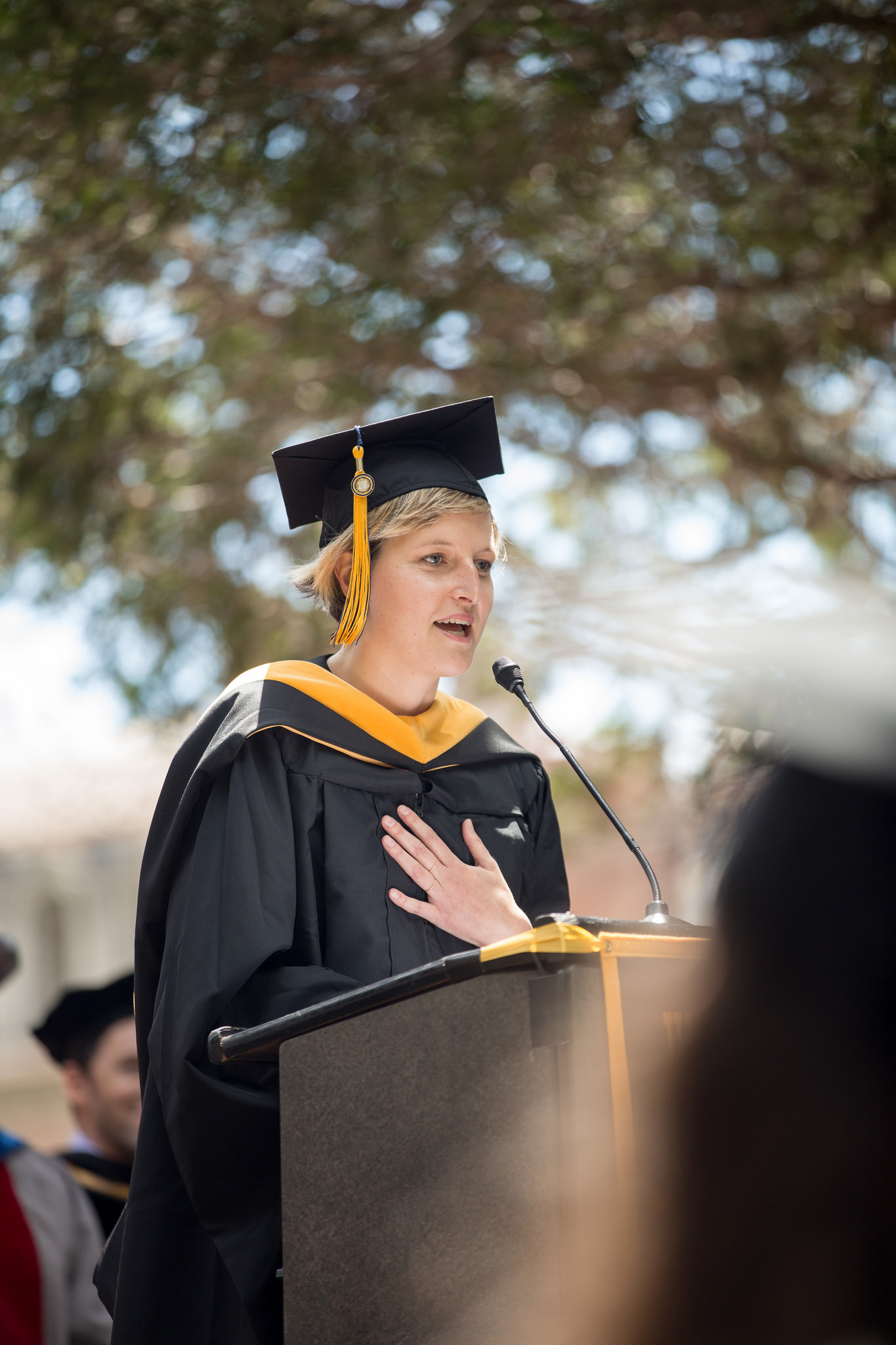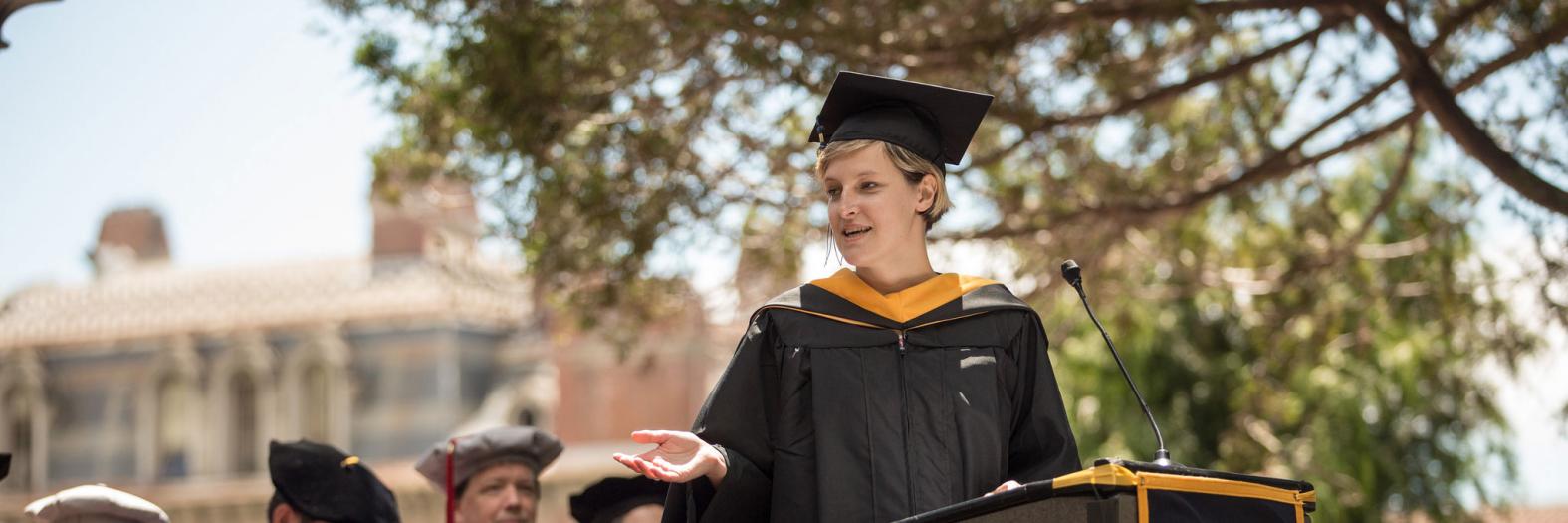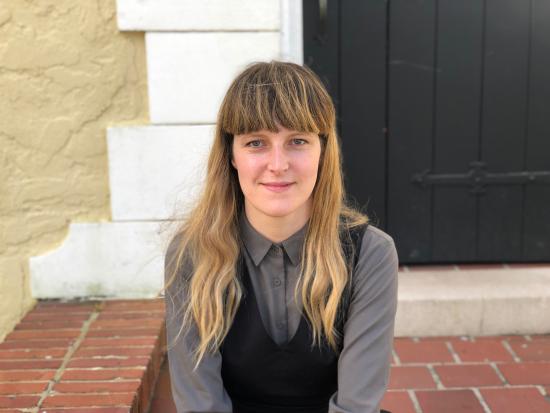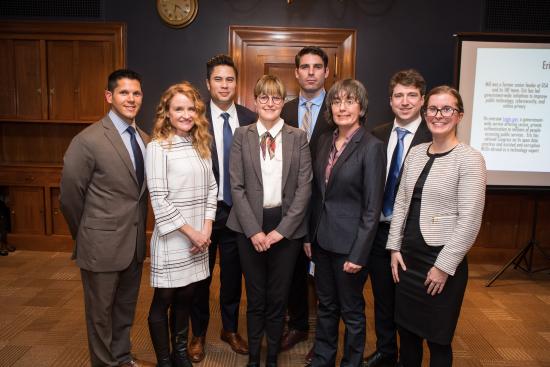This 2019 interview is focused on Emily’s role as a TechCongress Congressional Innovation Fellow. She is currently the Project Director at Upturn, nonprofit based in Washington, DC, that aims to advance equity and justice in the design, governance, and use of technology.
Technology is quickly revolutionizing almost every aspect of life and every issue relating to the public sector. The field of public interest technology draws on the history of public interest law, which emerged in the 1980s, and transformed legal education — fostering the development of legal clinics serving the poor and vulnerable and advocating on behalf of the public. UC Berkeley alumni have been at the forefront of both emerging public interest fields.
The TechCongress Congressional Innovation Fellowship, a year-long program that gives technologists first-hand experience in federal policymaking, is one pathway to building a modern government with technology talent and shaping the future of tech policy.

MIMS alumna Emily Paul is a member of the 2019 cohort of TechCongress fellows. At the I School, Emily focused on user research, design research, information architecture, and equity and inclusion in technology — skills that she brought to her work at Salesforce where she spent over two years following graduation. Now, as TechCongress fellow, Emily brings her technology expertise to the policymaking process.
Emily tells us more about her work, what motivates her, and what she hopes to accomplish in her fellowship:
Tell us about your TechCongress placement, what you've been doing so far, and what you see on the horizon for the year ahead.
I started in January 2019 as a Congressional Innovation Fellow with TechCongress. I’m working in the office of Congressman Mark Takano (CA-41) for the year. I am just a few weeks into my placement right now but have already started doing some really interesting work on technology issues in criminal justice. The Congressman is the Chair of the House Committee on Veterans’ Affairs and one of the subcommittees is on technology modernization so I hope to be able to use my background as a user experience researcher to support that effort. He is also on the House Committee on Education & Labor so I’m interested in looking for opportunities to work on issues related to technology in education and labor. In addition to the policy areas I mentioned, I am excited to be in Congress and learn about the policymaking process as much as I can during the year.
What motivated you to make the move from using your expertise in the tech industry to public policy?
Before coming to the I School I worked in nonprofits and continued my interest in policy during my time at the I School and at Salesforce through side projects and volunteering. So I always wanted to be involved in political work and find different ways for that to be part of my life, whether through my day job or other activities. Based on my experience at the I School and at Salesforce, I feel strongly that we need to make more collective decisions as a society about how technology is designed, built, and used. These decisions must involve not only the users of digital products and services but also the people who are affected indirectly. I decided to do the TechCongress fellowship because I want to better understand the policymaking process and how it can be leveraged to enable these collective decisions.
How did your I School experience influence your decision to go for the fellowship?
My experience at the I School gave me both the motivation and the confidence to apply for the TechCongress fellowship. During my time at the I School, I was able to study the interdisciplinary theories involved in creating and analyzing technology and put these theories into practice. That experience helped me see the importance of all the decisions that go into not only designing and building technology but also into determining how and in what contexts it is implemented and how it is used on a daily basis. My time at the I School also helped me see how vast the field of information science (or technology studies) is and that rather than needing to be an expert in every part of it, I need to be able to ask the right questions and bring the right people into a conversation to complement my knowledge and experience.
What do you hope to accomplish in your time as a TechCongress Fellow?
I have a few high-level goals for myself during my time as a TechCongress Fellow. The first is to develop a meaningful understanding of Congress including the factors that influence the policymaking process and the policy tools available to make change. Second, I want to make contributions to the framing of and take concrete action on some of the issues I care about (criminal justice technology; labor and technology; and other areas where technology interacts with systemic inequities). Third, it is important to me to add value to the office I am in and to build relationships within Congress and with external stakeholders.
Why was the I School right for you?
Probably the best thing about the I School for me was the interdisciplinary curriculum and the flexibility. I loved being able to complement my I School coursework with classes in other departments, in particular, a critical theory class I took in the Education Department. The mix of theory and application that the I School offers was really energizing for me. It enabled me to constantly reflect on how I was approaching my work and try out different approaches. The tension between abstract ideas and concrete actions can be difficult to navigate at times, but I think constantly seeking the balance between the two is essential to being a responsible technologist. I also feel really grateful for the community of people I met at the I School and the support I received from so many members of the faculty and staff.

What was your I School Research or focus?
I decided I wanted to focus on user research at the end of my first semester at the I School after taking Jenna Burrell’s qualitative research methods class. Coming in I already had an interest in our criminal justice system and the ways that it perpetuates racism and classism in our society. At the I School I focused this interest on the use of automated decision-making in criminal justice and wrote several papers on issues around the use of probabilistic predictions in criminal sentencing. This interest in algorithmic decisions also motivated my final project (with Rena Coen and Pavel Vanegas) on inference and personalization in online content.
What was your favorite class at the I School?
I had several favorite classes and use the knowledge and skills I learned from them on a daily basis. Some of my favorites were: Qualitative Research Methods; Information Law and Policy; and Information Visualization and Presentation. These classes gave me practical skills like the research methods I used in my work as a user researcher and am adapting to my policy research in Congress; a foundational history of technology law that helps me think through how to approach the issues I am tackling in my fellowship; and the ability to critically assess how visualizations can be used to enhance people’s understanding of data. Classes like Social Issues of Information; Reimagining the Body; and Concepts of Information gave me the theoretical background to identify and challenge assumptions in the technology narratives that show up in my work and in my daily life.
Do you have any advice for aspiring information professionals?
Read the I School Pledge!
This article was published in 2019. Emily is currently a Policy Analyst at Upturn.












